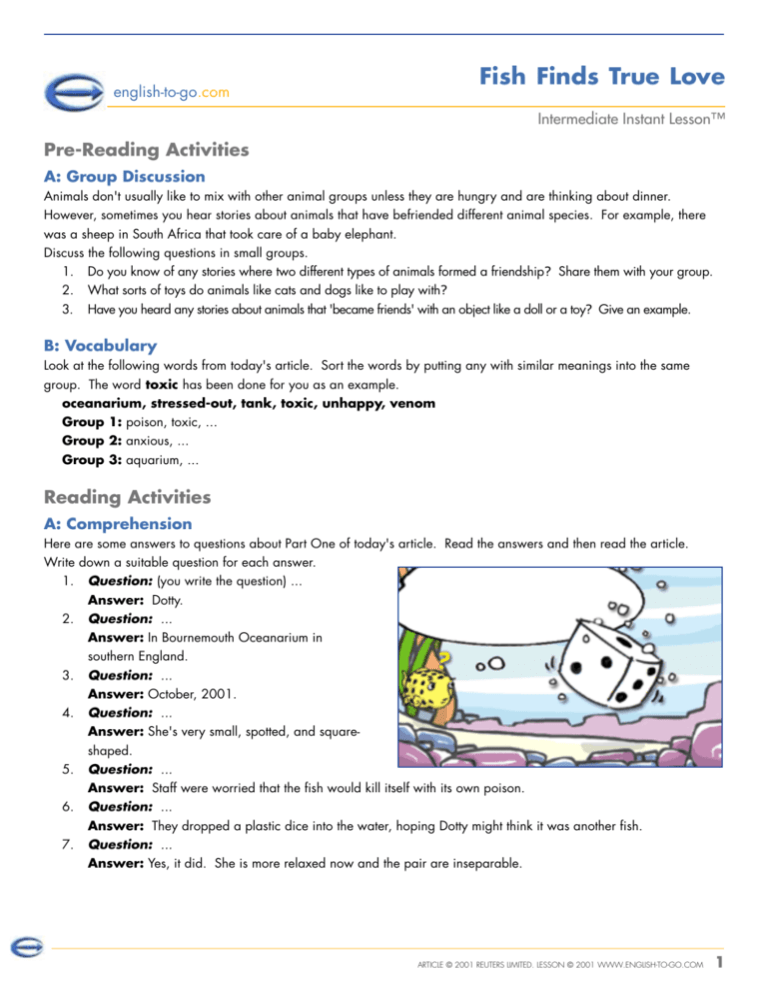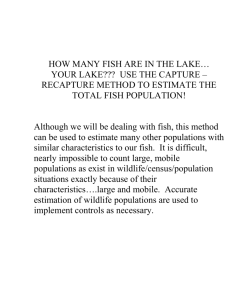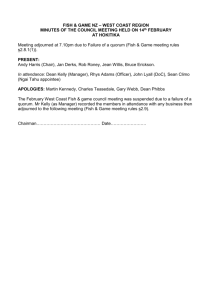
english-to-go.com
Fish Finds True Love
Intermediate Instant Lesson™
Pre-Reading Activities
A: Group Discussion
Animals don't usually like to mix with other animal groups unless they are hungry and are thinking about dinner.
However, sometimes you hear stories about animals that have befriended different animal species. For example, there
was a sheep in South Africa that took care of a baby elephant.
Discuss the following questions in small groups.
1. Do you know of any stories where two different types of animals formed a friendship? Share them with your group.
2. What sorts of toys do animals like cats and dogs like to play with?
3. Have you heard any stories about animals that 'became friends' with an object like a doll or a toy? Give an example.
B: Vocabulary
Look at the following words from today's article. Sort the words by putting any with similar meanings into the same
group. The word toxic has been done for you as an example.
oceanarium, stressed-out, tank, toxic, unhappy, venom
Group 1: poison, toxic, ...
Group 2: anxious, ...
Group 3: aquarium, ...
Reading Activities
A: Comprehension
Here are some answers to questions about Part One of today's article. Read the answers and then read the article.
Write down a suitable question for each answer.
1. Question: (you write the question) ...
Answer: Dotty.
2. Question: ...
Answer: In Bournemouth Oceanarium in
southern England.
3. Question: ...
Answer: October, 2001.
4. Question: ...
Answer: She's very small, spotted, and squareshaped.
5. Question: ...
Answer: Staff were worried that the fish would kill itself with its own poison.
6. Question: ...
Answer: They dropped a plastic dice into the water, hoping Dotty might think it was another fish.
7. Question: ...
Answer: Yes, it did. She is more relaxed now and the pair are inseparable.
ARTICLE © 2001 REUTERS LIMITED. LESSON © 2001 WWW.ENGLISH-TO-GO.COM
1
Part One
Fish Finds True Love with a Throw of the Dice
LONDON Friday November 2 (Reuters) - A stressed-out spotted fish
its own poison.
in a British aquarium has calmed down after finding its perfect
“We finally went out and bought a real dice and popped it
match -- a lookalike plastic dice.
in the tank hoping Dotty might think it was another fish,'' disDotty, a highly toxic boxfish -- also known as dicefish be- plays manager Kris Pring told Reuters on Thursday.
cause of its square shape and spotty coloring-- arrived at Bourne“It did the trick and now Dotty won't leave it alone. The
mouth Oceanarium in southern England last month.
pair are inseparable.” (Continued.../)
But the pea-sized tropical fish, which releases venom when
anxious, was so unhappy that staff feared it could kill itself with ARTICLE © 2001 REUTERS LIMITED. LESSON © 2001 WWW.ENGLISH-TO-GO.COM
B: True / False / Not Mentioned
Read the statements below and compare them with the information in Part Two of today's article. Write T if the statement
is true, F if it is false, and NM if the text does not mention that information.
1. Dotty may believe that the dice is one of her parents.
2. Dotty is bigger than the dice.
3. She is yellow and black.
4. As Dotty gets older, she will become bright yellow in color.
5. The maximum length of a boxfish is one foot.
6. She has stopped growing.
7. Boxfish are found only in the Pacific Ocean.
8. Now Dotty does not share her tank with any other fish.
Part Two
Pring said Dotty probably thought the dice was a in length and is commonly found throughout the Indo-Pacific.
Pring said the lovestruck Dotty would stay in quarantine
potential mate, or possibly even a parent.
“Whenever someone approaches, Dotty scoots over and until she got much bigger and would then go on public display.
hides behind the dice which is much bigger than the fish.”
The pale yellow and black boxfish can grow to more than a foot ARTICLE © 2001 REUTERS LIMITED. LESSON © 2001 WWW.ENGLISH-TO-GO.COM
(...continued.)
C: Summarizing
The following text contains a summary of the article, but it has some mistakes. Cross out the incorrect words and replace
them with the correct ones.
Staff at an oceanarium in southern France have found a way to keep a large boxfish happy; they threw a plastic dice into
her fish bowl. Dotty, the yellow and red boxfish, is poisonous and when she gets anxious, she releases blood which could
kill her. The staff decided that a dice would be a good addition to Dotty's fish bowl because the dice looks like a big
stone. Whenever Dotty gets nervous, she hides behind the dice which is much brighter than Dotty. Dotty is expected to
stay in quarantine with other fish, until she gets a lot larger and after that, the general public will be able to see her.
D: Vocabulary
Part One: Look at List A which includes some words from today's article. Match phrases from List B to a word in List A.
In some cases there may be more than one answer.
List A
List B
calm
into the water
pop it
under the table
hide
down
behind the curtain
into his mouth
Part Two: Choose a word (or two) from List A above that is new to you. Write your own sentences using the word. Be
ready to share these with the class.
ARTICLE © 2001 REUTERS LIMITED. LESSON © 2001 WWW.ENGLISH-TO-GO.COM
2
Post-Reading Activities
You may do one or more of these.
A: Language
Writers like using adjectives, because they can give information about someone or something and make a sentence
shorter, if used correctly.
Look at the following sentences:
i. Dotty is a fish that is the size of a pea.
ii. Dotty is a pea-sized fish.
Which sentence is shorter?
Fill in the blanks in these sentences with your own ideas.
1. Dotty is a __________ - shaped fish.
2. A manta ray (stingray) is a __________ - shaped fish.
3. I have __________ - shaped eyes.
4. I live in a __________ - sized house / apartment.
5. My house / apartment is __________ - shaped.
6. During a bad hail storm, some __________ - sized hail can put big dents in cars.
B: Writing
A comic strip is a series of drawings that tell a story. Below is a comic strip called "Dotty". With a partner look at the
four pictures. What is Dotty thinking or saying? Write the words in the speech / thought bubbles. Use your imagination
and have fun!
ARTICLE © 2001 REUTERS LIMITED. LESSON © 2001 WWW.ENGLISH-TO-GO.COM
3
C: Vocabulary
Look at the following sentence:
Dolly found her perfect match - a plastic dice.
In this example dice is singular, however, in old-fashioned English dice was plural for die. Thus, people used to say,
"One die, two dice." Now it is common for people to say 'dice' for both the singular and the plural.
Below are some basic spelling rules for words when they change from singular to plural.
• the plural form for most words end in -'s'
• singular words that end in 's' , 'sh' , 'tch' , 'x' , and 'z' have -'es' added to them (bus > buses, dish > dishes,
patch > patches, fox > foxes, waltz > waltzes)
• singular words that end in a consonant + y change to -'ies' (e.g. hobby > hobbies)
• singular words that end in 'f' , 'ff' , and 'fe' usually drop the ending and add 'ves' (e.g. leaf > leaves, knife > knives)
• some singular words do not change at all (e.g. sheep > sheep)
Unfortunately, there are many irregular plural forms that do not follow any spelling rules. You must simply memorize
the spelling.
Are you ready to take the Plural Test? Do not use your dictionary until you are finished. Good luck! The first one has
been done for you as an example.
Singular
Plural
Singular
Plural
cactus
cacti
daisy
elf
fungus
mattress
loaves
octopus
media
fish
potato
phenomena
quiz
salmon
species
ARTICLE © 2001 REUTERS LIMITED. LESSON © 2001 WWW.ENGLISH-TO-GO.COM
4
TEACHERS' NOTES AND ANSWER KEY
Pre-Reading Activities
A: Group Discussion - Notes
(The story about the sheep and the elephant is found in the Intermediate-Upper
Intermediate Instant Lesson 'Mother and Son' in the www.english-to-go.com Instant
Lessons Library.)
B: Vocabulary - Answers
Group 1: poison, toxic, venom (These words are all related to the word 'poison'.
Toxic is an adjective meaning 'poisonous'.)
Group 2: anxious, stressed-out, unhappy (These words are all adjectives
describing different negative emotional states.)
Group 3: aquarium, oceanarium, tank (These words all nouns connected with
keeping fish in captivity.)
Reading Activities
A: Comprehension - Suggested Answers
1. What is the name of the fish?
2. Where is Dotty being kept?
3. When did Dotty arrive at the oceanarium?
4. What does Dotty look like?
5. What were staff at the oceanarium worried about?
6. How did they try to solve the problem?
7. Did the plan work?
B: True / False / Not Mentioned - Answers
1.T, 2.F, 3.T, 4.NM, 5.F, 6.F, 7.F (They are also found in the Indian Ocean), 8.T
C: Summarizing -Notes
Students may not know the difference between a 'bowl' and a 'tank'. A bowl is
round in shape.
C: Summarizing - Suggested Answers
Staff at an oceanarium in southern France (England) have found a way to keep a
large (tiny) boxfish happy; they threw a plastic dice into her fish bowl (tank or
aquarium). Dotty, the yellow and red (black) boxfish, is poisonous and when she
gets anxious, she releases blood (venom) which could kill her. The staff decided that
a dice would be a good addition to Dotty's fish bowl (tank / aquarium) because the
dice looks like a big stone (boxfish). Whenever Dotty gets nervous, she hides
behind the dice which is much brighter bigger than Dotty.
Dotty is expected to stay in quarantine with other fish (by herself), until she gets a lot
larger and after that, the general public will be able to see her.
D: Vocabulary - Notes
After students have completed the activity, you may like to use this extension activity.
Ask different students in the class to mime these actions:
To calm down.
To hide under a desk
To pop a piece of gum into your mouth
To pop your head around the door
To pop a balloon
To hide a letter under a book
To hide your face in your hands
To hide your excitement
To hide behind another student
(Show the action only to the student who is doing the miming.)
The student then asks the others in the class, "What was I doing?" They try to
answer using the correct verb: e.g. "You were hiding under a desk." etc. Some of
the actions are of course more difficult to mime than others, so you may like to select
students who you think are better actors, or who will enjoy the challenge of trying
these ones. Intervene only if you need to clear up any misunderstandings about any
of the uses of the verbs.
Post-Reading Activities
A: Language - Notes
'Pea-sized' is a participle acting as an adjective.
A: Language - Answers
Sentence ii is shorter.
1. Dotty is a square - shaped fish,
2. A manta ray is a diamond - shaped fish,
3. Answers will vary,
4. Answers will vary,
5. Answers will vary,
6. During a bad hail storm, some golfball / baseball - sized hail can put dents in
cars.
B: Writing - Notes
The students probably won't need any incentive to do this activity, but just in case,
you could tell the students that you plan to put each pair's comic strip on the walls of
the class for everyone to look at.
C: Vocabulary - Notes
Students could do this alone or in pairs. You could make it a competition, by
offering a prize to the student or pair who finishes first without making any mistakes.
*When referring to fish as a creature, the plural of the word may be fish or
fishes. Fish is the more usual form. e.g. "I caught lots of fish today." Fishes refers
to different kinds or species of fish. Fish as a food is uncountable. (I bought some
fish for dinner.)
C: Vocabulary
Singular
cactus
daisy
elf
fish
fungus
loaf
mattress
medium
octopus
phenomenon
potato
quiz
salmon
species
- Answers
Plural
cacti
daisies
elves
fish*
fungi
loaves
mattresses
media
octopuses
phenomena
potatoes
quizzes
salmon
species
Please Note: If your students would like to see pictures
from the Bournemouth Oceanarium, the address is
http://www.oceanarium.co.uk/
For other lessons about fish characters, students may enjoy
the instant lessons "Yummy Fish" and "Tish the fish".
D: Vocabulary - Suggested Answers
Part One
calm down
pop it into the water / into his mouth
hide under the table / behind the curtain
© 2001 English To Go Ltd. All rights reserved. News article © 2001 Reuters, used with permission. Not to be reproduced or stored in any way without the permission of English To Go
Ltd. http://www.english-to-go.com English To Go and Instant Lessons are the registered trade marks of English To Go Ltd. email: editor@english-to-go.com
011102anil
ARTICLE © 2001 REUTERS LIMITED. LESSON © 2001 WWW.ENGLISH-TO-GO.COM
5





